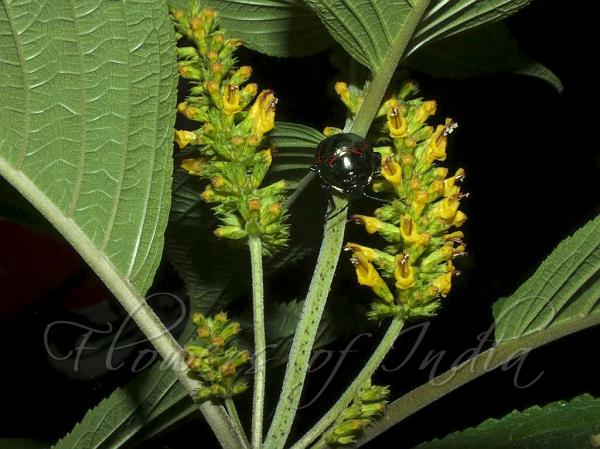|
| Yellow Himalayan Mint |
|

|

| File size | 220117 |
| Original date | 9/22/17 1:27 PM |
| Resolution | 1024 x 768 |
| Flash | Flash fired |
| Focal length | 12.3mm |
| Exposure time | 1/4000s |
| Aperture | 11.0 |
| Focus Distance | 0.0m |
| Metering Mode | Multi-segment |
| Camera make | FUJIFILM |
| Camera model | FinePix HS35EXR |
| Sensor type | OneChipColorArea |
|
|
|
|
Photo: |
Botanical name: Elsholtzia flava Family: Lamiaceae (Mint family)
Synonyms: Aphanochilus flavus
Synonyms: Aphanochilus flavus
Yellow Himalayan Mint is an erect subshrub, 0.6-2.6 m
tall. Branches are densely gray velvet-hairy. Leaf-stalk is 3-6 cm;
leaf blade broadly ovate to sub-circular, 8-15 × 5.2-8.2 cm, above
velvet-hairy especially on veins, below hairless, densely yellowish
glandular, base rounded to shallowly heart-shaped, oblique, margin
sawtoothed to rounded toothed, tip abruptly with a tapering tail.
Flowers are borne in spikes at branch-ends and in leaf-axils, robust,
6-12 cm, stalked, densely gray velvet-hairy. Lower verticillasters are
widely spaced; bracts broadly ovate, about 3 × 3 mm, sparsely finely
velvet-hairy below, margin fringed with hairs, tip with a short sharp
point. Flower-stalks are about 1 mm. Calyx is bell-shaped, about 3.5
mm, velvet-hairy, glandular outside, tip velvet-hairy inside; teeth
subulate-linear, tip linear; fruiting calyx tubular-bell-shaped, to 6.5
× 2.5 mm. Flowers are yellow, about 6.5 mm, white hairy, glandular
outside, bearded inside; tube about 4 mm, funnel-shaped, to 2 mm wide
at throat; upper lip notched; middle lobe of lower lip nearly circular,
margin erose; lateral lobes nearly oblong, rounded. Nutlets are dark
brown, oblong, about 1 mm. Yellow Himalayan Mint is found in the
Himalayas, from Kumaun to Sikkim, NE India, China, at altitudes of
1900-2700 m.
Flowering: July-October.
| Identification credit: Nidhan Singh | Photographed in Dhanaulti, Uttrakhand. |
• Is this flower misidentified? If yes,